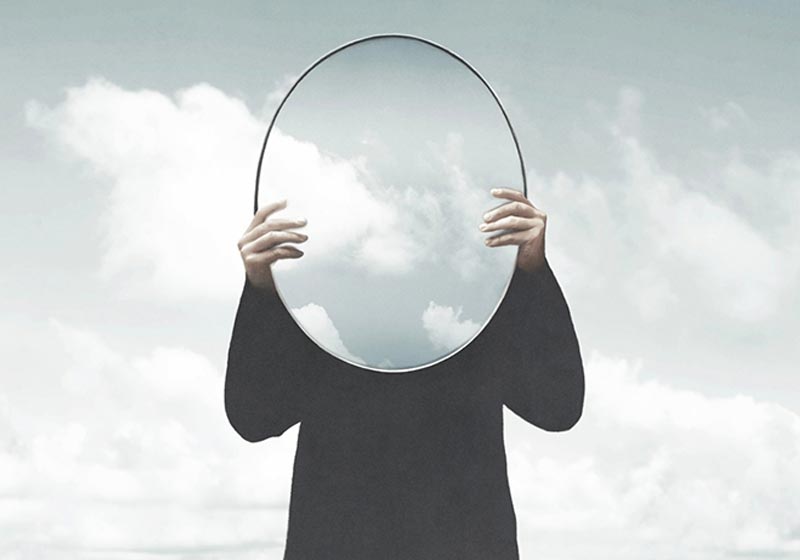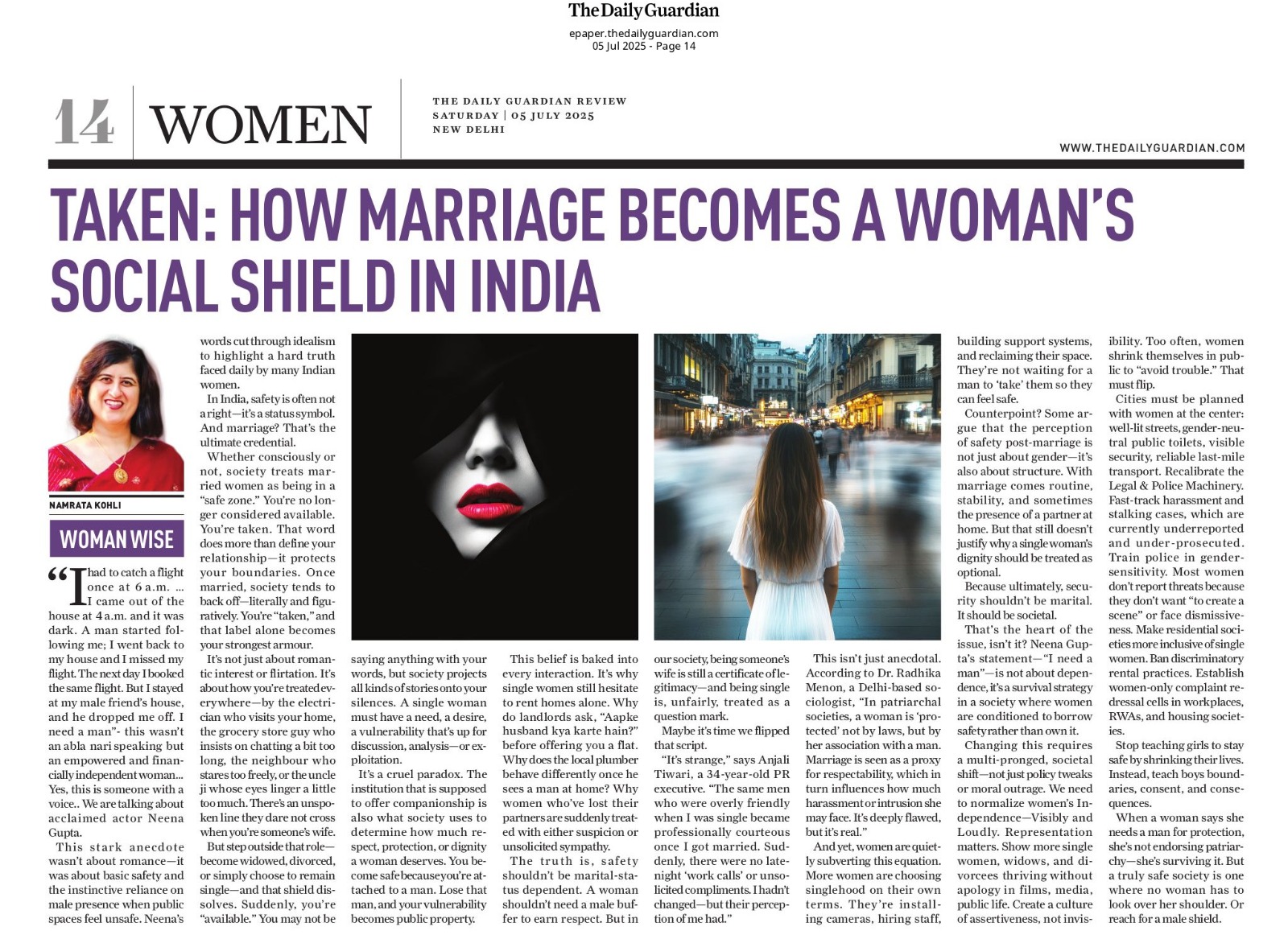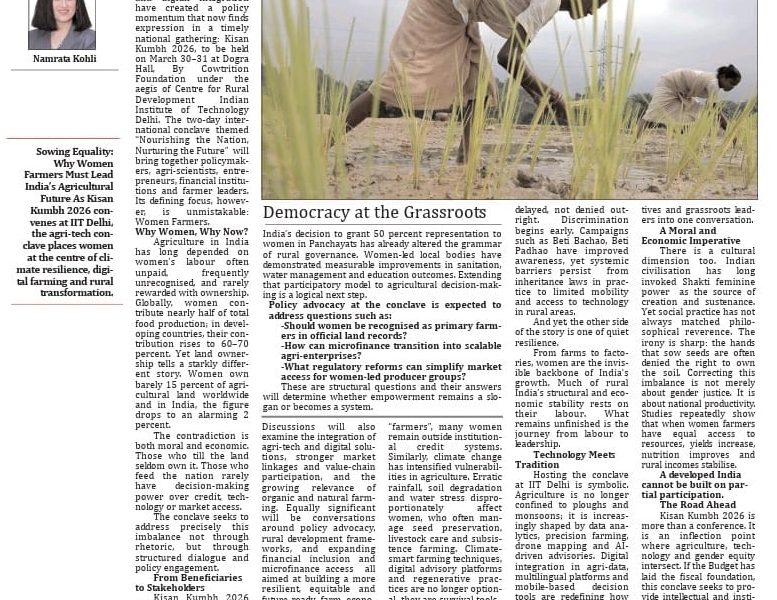“I had to catch a flight once at 6 a.m. … I came out of the house at 4 a.m. and it was dark. A man started following me; I went back to my house, and I missed my flight. The next day I booked the same flight. But I stayed at my male friend’s house, and he dropped me off. I need a man”- this wasn’t an abla nari speaking but an empowered and financially independent woman…Yes, this is someone with a voice… We are talking about acclaimed actor Neena Gupta.
This stark anecdote wasn’t about romance—it was about basic safety and the instinctive reliance on male presence when public spaces feel unsafe. Neena’s words cut through idealism to highlight a hard truth faced daily by many Indian women.
In India, safety is often not a right—it’s a status symbol. And marriage? That’s the ultimate credential.

Whether consciously or not, society treats married women as being in a “safe zone.” You’re no longer considered available. You’re taken. That word does more than define your relationship—it protects your boundaries. Once married, society tends to back off—literally and figuratively. You’re “taken,” and that label alone becomes your strongest armour.
It’s not just about romantic interest or flirtation. It’s about how you’re treated everywhere—by the electrician who visits your home, the grocery store guy who insists on chatting a bit too long, the neighbour who stares too freely, or the uncle ji whose eyes linger a little too much. There’s an unspoken line they dare not cross when you’re someone’s wife.
But step outside that role become widowed, divorced, or simply choose to remain single—and that shield dissolves. Suddenly, you’re “available.” You may not be saying anything with your words, but society projects all kinds of stories onto your silences. A single woman must have a need, a desire, a vulnerability that’s up for discussion, analysis—or exploitation.
It’s a cruel paradox. The institution that is supposed to offer companionship is also what society uses to determine how much respect, protection, or dignity a woman deserves. You become safe because you’re attached to a man. Lose that man, and your vulnerability becomes public property.
This belief is baked into every interaction. It’s why single women still hesitate to rent homes alone. Why do landlords ask, “Aapke husband kya karte hain?” before offering you a flat. Why does the local plumber behave differently once he sees a man at home? Why women who’ve lost their partners are suddenly treated with either suspicion or unsolicited sympathy.
The truth is that safety shouldn’t be marital-status dependent. A woman shouldn’t need a male buffer to earn respect. But in our society, being someone’s wife is still a certificate of legitimacy—and being single is, unfairly, treated as a question mark.

Maybe it’s time we flipped that script.
“It’s strange,” says Anjali Tiwari, a 34-year-old PR executive. “The same men who were overly friendly when I was single became professionally courteous once I got married. Suddenly, there were no late-night ‘work calls’ or unsolicited compliments. I hadn’t changed—but their perception of me had.”
This isn’t just anecdotal. According to Dr. Radhika Menon, a Delhi-based sociologist, “In patriarchal societies, a woman is ‘protected’ not by laws, but by her association with a man. Marriage is seen as a proxy for respectability, which in turn influences how much harassment or intrusion she may face. It’s deeply flawed, but it’s real.”
And yet, women are quietly subverting this equation. More women are choosing singlehood on their own terms. They’re installing cameras, hiring staff, building support systems, and reclaiming their space. They’re not waiting for a man to ‘take’ them so they can feel safe.
Counterpoint? Some argue that the perception of safety post-marriage is not just about gender—it’s also about structure. With marriage comes routine, stability, and sometimes the presence of a partner at home. But that still doesn’t justify why a single woman’s dignity should be treated as optional.
Because ultimately, security shouldn’t be marital. It should be societal.
That’s the heart of the issue, isn’t it? Neena Gupta’s statement— “I need a man”—is not about dependence, it’s a survival strategy in a society where women are conditioned to borrow safety rather than own it.

Changing this requires a multi-pronged, societal shift—not just policy tweaks or moral outrage. We need to normalize women’s Independence—Visibly and Loudly. Representation matters. Show more single women, widows, and divorcees thriving without apology in films, media, public life. Create a culture of assertiveness, not invisibility. Too often, women shrink themselves in public to “avoid trouble.” That must flip.
Cities must be planned with women at the center: well-lit streets, gender-neutral public toilets, visible security, reliable last-mile transport. Recalibrate the legal and police machinery. Fast-track harassment and stalking cases, which are currently underreported and under-prosecuted. Train police in gender sensitivity. Most women don’t report threats because they don’t want “to create a scene” or face dismissiveness. Make residential societies more inclusive of single women. Ban discriminatory rental practices. Establish women-only complaint redressal cells in workplaces, RWAs, and housing societies.
Stop teaching girls to stay safe by shrinking their lives. Instead, teach boys boundaries, consent, and consequences.
When a woman says she needs a man for protection, she’s not endorsing patriarchy—she’s surviving it. But a truly safe society is one where no woman has to look over her shoulder. Or reach for a male shield.




